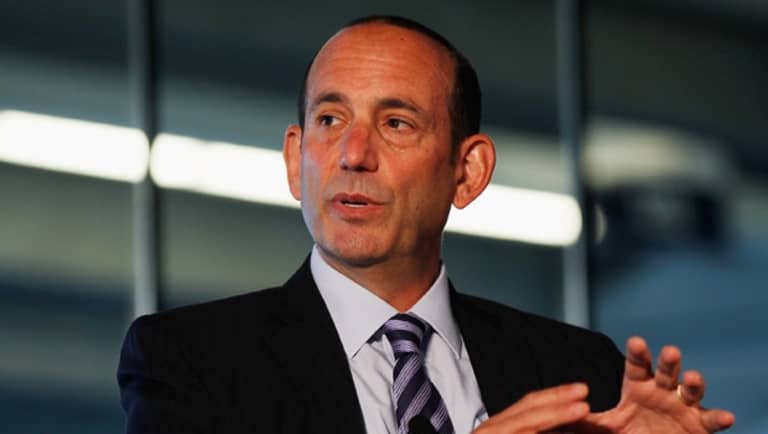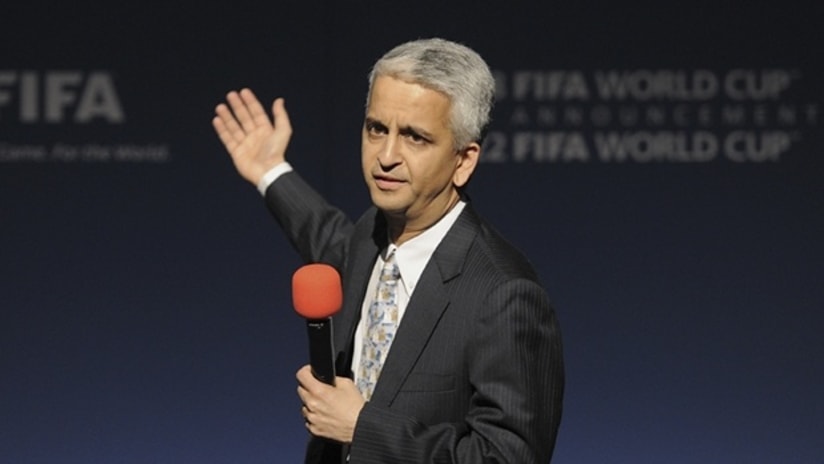The FIFA World Cup's return to the United States will be “a record-setting, unbelievable experience for the entire world,” but it won't happen until reforms are made to the process by which the tournament's hosting rights are awarded.
That was the message from U.S. Soccer President Sunil Gulati and MLS Commissioner Don Garber as they addressed the Bloomberg Sports Business Summit in New York on Thursday.
“We want to host the World Cup at some point in the future. The [20]20s sound like a good time, but I've been pretty clear that we want to see some changes made in the process,” said Gulati, alluding to a FIFA Ethics Committee investigation on the awarding of the 2018 and 2022 World Cups, the latter of which was awarded to Qatar over the US in contentious circumstances.
“In the next couple of weeks we'll have an indication of some comments about that process. Whatever comes out of that, I think you'll see some improvements that will have gone through the World Cup bidding process. The IOC [International Olympic Committee] went through this, FIFA's gone through this, I think there's still more to be done. But do we want to host the World Cup in the US again in the future? The answer is of course we do.”
However, despite the two nations' partnership on MLS, any such future bids are likely to compete with, rather than in cooperation with, Canada, who are also rumored to be contemplating a hunt for the world's biggest sporting spectacle.
“The FIFA rules are pretty straightforward on this issue at this point, that there's only joint bids allowed in the case of a country that doesn't have sufficient infrastructure or stadiums – basically out of necessity,” said Gulati. “If we look at a World Cup in the future, at this point we'd be looking to do it ourselves.”

Asked whether the country could host the 2018 event on short notice should Russia's rights be revoked, Garber extolled the United States' state-of-the-art sporting infrastructure but noted that the World Cup's legacy would be enhanced by a longer lead-in time.
“We have the capability, without doubt. The facilities we have here – the facilities we take down, like the old Giants Stadium to build MetLife [Stadium], are probably better than most facilities in the world,” said Garber. “So we have cities across the country that have the ability to turn on the switch and host the World Cup.
“[But] having the runup to the World Cup is better for what we're trying to achieve, to be able to have the right relationships with municipalities, to build grassroots movements, to go out to those cities and have them bid on it, make commitments to the sport at all different level, including at the professional level.”
But MLS's top executive left little doubt that with the game's massive growth in the United States, a stateside World Cup will be a landmark event that would smash myriad historical records, many of which are still held by the tournament's first visit to the US.
“The 1994 World Cup, which was 20 years ago, was the most successful World Cup that's ever been held, in terms of the number of fans, in terms of the legacy that was left behind,” said Garber. “That was a long time ago, before we became the soccer nation that we are today with all the excitement and euphoria and television ratings and the viewing parties being really the story of the summer.
“So imagine, if it was that way decades ago, what it will be the next time around. There's no question that it would be a record-setting, unbelievable experience for the entire world, without doubt.”










